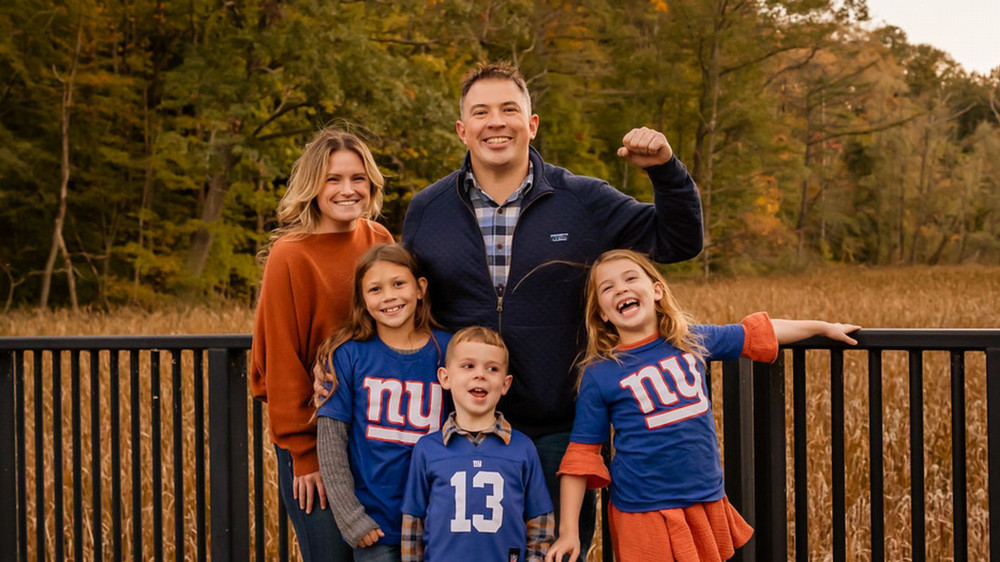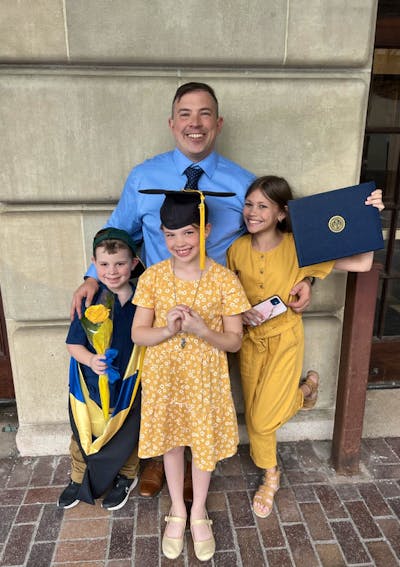Alumni Profile: Joseph Escobar Making the Most of Manager Role at Excellus
By Gianluca D'Elia
Tuesday, February 27, 2024

Joseph Escobar ’23N (MS), RN, has had a lifelong passion for pushing himself.
By the time he came to the University of Rochester School of Nursing as a master’s student, he brought an extensive career background that ranges from serving abroad in the U.S. Army to taking care of kids at the bedside on Golisano Children’s Hospital’s pediatric oncology floor.
That’s one of the reasons he felt drawn to the Leadership in Health Care Systems (LHCS) program. It would set its graduates up for success in any setting, and welcomed students from a diverse range of health care professions, his colleagues who had done the program told him. The more he researched the LHCS program, he realized it would be an excellent fit.
“Learning from each other’s different backgrounds was informative and insightful,” said Escobar, who is currently a Medicare case management manager for Excellus Blue Cross Blue Shield. “My role in a health plan has many different clinical disciplines that I need to interact and work with to deliver the best possible outcomes for our patients.”
About Joseph:
I have been a registered nurse for about 11 years, and I’m originally from York, Pennsylvania. I enlisted into the U.S. Army after high school to serve my country after the Sept. 11 attacks, and wanted to do my part for my country. After serving at the prestigious 10th Mountain Division in Watertown, New York for five years and two tours in Iraq, I decided to go to college here in Rochester. I drew upon my friends who were medics in the Army and realized nursing would be a seamless transition to help those in need. After graduating from Nazareth College, I worked in a variety of patient settings, including med-surg and kidney transplant, and eventually found a position here at Golisano Children's Hospital in the Pediatric Oncology floor.
How did you discover an interest in health care leadership?
As a pediatric nurse, I continuously pushed myself clinically to learn more and "picked-up" helping hands shifts in the Pediatric Emergency room. Eventually, I felt called to apply for a position in leadership, becoming an Assistant Nurse Manager in the Pediatric Emergency. I continued to push myself and further my education, and enrolled in UR Nursing’s LHCS program. I knew I wanted to further develop and build critical leadership skills, and had heard that the LHCS degree would be the best choice for me.
As the COVID-19 pandemic was approaching, I made a career decision to change positions within the health care system, this time embarking on the insurance side and becoming a case manager for Medicaid patients at Excellus Blue Cross Blue Shield (BCBS) here in Rochester.
My lifelong passion for pushing myself has earned me two promotions within Excellus, and I am now the manager of the Medicare Case and Disease Management program.
"If I have learned anything in my life, especially as a nurse, it is that in order to be successful, you must always push yourself to learn new and challenging topics, and to never stop achieving your goals, no matter how long it takes." - Joseph Escobar ’23N (MS), RN
How did you hear about the LHCS program?
I learned about the Leadership in Healthcare Systems degree by doing research and asking former students who had graduated from the course. They stated how challenging yet achievable it was, and that an individual who graduated from this program would have the tools necessary to be successful in a leadership position within any health care setting.
Learning from different backgrounds and students was informative and insightful, as my role in a health plan has many different clinical disciplines that I need to interact with and work within order to deliver the best possible outcomes for our patients. In some ways, being successful in health care is a lot like being in the military: different roles with different responsibilities, all coming together to achieve a mission.
How has the LHCS program been helpful to you as a health care professional currently outside of the nursing field?
This program truly understood everyone’s role in the holistic mission of a health care organization. It takes all partners involved in a health care organization to work together and share their experiences and expertise to deliver better outcomes. It is equally important for our nurses to see that, and to gain that experience of working with different clinical backgrounds. If anyone can function in a multidisciplinary role, it should be the nurses!

What were some of your biggest takeaways from the LHCS program?
Some of the biggest takeaways from the program were in my final year: developing my capstone project and learning how the process works to develop an idea or implement a new program.
As a leader in my current role, identifying a problem and coming up with a solution may seem like an easy task, but in a large organization, one has to consider all the levels and processes involved in making change. Change is the one constant in life, as some would say, but it is the hardest to implement in an organization because it requires multiple levels of work in order to achieve buy-in and eventually become successful. Each course in the Leadership program helped me understand that, and ultimately led me to be successful in my role as a manager and leader at Excellus BCBS.
What did you do for your capstone project, and how do you feel it has made in impact?
My LHCS capstone project was a Crisis Call Training program for our new and current team members. Our work is strictly telephonic-based and I recall being a new staff member encountering a member who was feeling suicidal. Having only the knowledge of suicide training from the military, I drew upon those skills and reach out to my supervisor for assistance in calling 911. After a successful call and getting the member the help they needed, I felt a little defeated and unprepared. I channeled those energies into trying to learn more about crisis intervention, and developed and created our department's revamped crisis training platform for all new and current hires.
Can you tell us a little bit about what your current job is like?
On a Medicare Manager Case Management Team, we support and help our members overcome health care disparities and challenges. I also hold 1:1 conversations with my supervisors and staff to help ensure they are successful, and more importantly, to “check in” with them. In my personal experience, if the staff feel you don’t care about them on a personal level, it will be incredibly challenging for them to care about your professional mission.
I also collaborate with other multidisciplinary teams such as social work, quality care teams, analytics and data teams, as well as our vendor programs to ensure they are also fulfilling their contractual obligations to supporting our members.
There is no typical day in this role, which is why it is challenging and rewarding in itself. The Leadership program truly helped me in so many ways, it taught me how to build the simplest project to the most complex project. And that at every stage of development of a project, you have to assess your intent with your resources and vision. Even if that is starting over, or just fine-tuning it. The master's program was very successful of incorporating those other multi-disciplinary teams with different backgrounds, because you’re never going to be the subject matter expert on everything. Collaboration is key to achieving any kind of success in health care.
Can you share any advice for current LHCS students?
My advice for students is to enjoy the journey, both in school and your personal life, and remember the advice from your professors. They have been there before! Be sure to take your time with your projects now, because it is much easier to rebound from mistakes now. When you graduate, you are the culmination of all your hard work and dedication, and truly looked upon as a leader.
Learn more about our Leadership in Health Care Systems master's degree.
Categories: Nursing Leadership, Alumni

